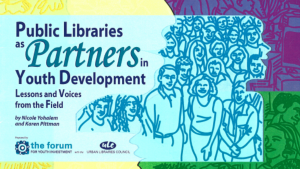
As a relative newcomer to the international world of youth development, I am struck by the amazing diversity in the basic definition of youth around the globe. Here in the Unites States, adolescence legally ends somewhere between 16 and 21
(depending upon the adult privilege being bestowed). Socially and economically, it continues to push out of the teen years and into the twenties as the traditional markers of self-sufficiency — job, marriage, independent living space — take
longer to achieve.
In Latin America, Africa and other regions, however, “youthhood” begins in the mid teens and extends into the 30s. The United Nations straddles the fence with 15–24. While I have been aware of the definitional differences, being immersed in international meetings has made me think about its significance. As my international learning curve goes up, I am becoming aware that the driving determinant of youthhood is often not culture, but economics.
A 29-year-old South African activist who heads a national program that engages youth in advocacy and policy development explained that the youth he works with are sometimes older than he. His organization defines youth as 16–30, arguing that this is the generation that has experienced a unique set of social forces. They are locked out of adulthood — if adulthood is defined as being employed — because they lack both the skills and the opportunities. More than half are out of school, out of work, undereducated and functionally illiterate. Even those in school are not being well trained. And the absorption capacity of the economy is low. Crime provides the easiest avenue for money. Employment training programs often set youth up for failure because there are no jobs. The challenge, the youth activist reports, is in developing programs that offer opportunities for skill building, responsibility and respect. Programs that acknowledge the need to help youth redefine adulthood in terms other than employment and income.
Another colleague who had just returned from Australia commented on the same definitional phenomenon. He was struck by how little unrest there was in Australia despite high youth unemployment rate — presumably because of the rich infrastructure of youth services and ample opportunities for making a responsible contribution.
Perhaps it is time to redefine youth in the United States. The gap between expectations and reality is tension producing for many young people in this country. With the exception of parenthood, the markers of adulthood are not easily achieved before age 20. Rather than blaming youth for failing to achieve what is becoming socially and structurally impossible, why not begin to broaden the definition of what “responsible, productive, adults” behavior is?
Suppose the definition of youth were statistically rather than historically driven: The upper age limit of “youthhood” equals the age at which two-thirds of that age cohort are out-of-school, employed and earning above poverty wages. My guess is that youthhood would end in the mid- to late twenties. As a responsible society, we would then have to consider two shifts.
First, we have to expand our definition of what youth can do. Youth participation would have to be pushed beyond service projects and teen councils to active involvement in all forms of community and political leadership. Second, we have to expand our definition of what communities must do. Supports and opportunities cannot be limited to after-school programs and prevention lectures. If young people are not going to be fully utilized in the labor market until well into their third decade, then we need to ensure that they have important civic and community work which they are publicly recognized and adequately compensated.
For college-bound youth, this redefinition has been underway for some time. Junior year off, graduate school, internships are now all legitimate ways to tread water while waiting for full-employment opportunities. But for non-college bound youth, what are the options? Currently, they are not unlike those available to youth in South Africa. Perhaps we should learn from our international neighbors that the developmental and economic needs of “youthhood” must be acknowledged if our young people are to be adequately prepared for and connected to the responsibilities of adulthood.
We welcome your contributions to the topic. Please reach out to talkwithus@kpcatalysts.com if you’d like to join to the discussion.

Pittman, K. (1996, January/February). “Aging Out or Aging In?.” Washington, DC: The Forum for Youth Investment. A
version of this article appears in Youth Today.



No comment yet, add your voice below!